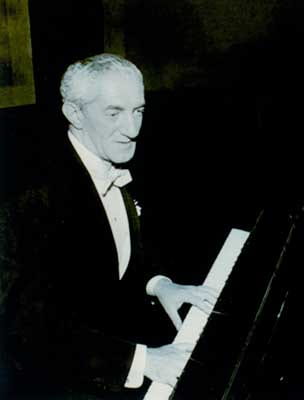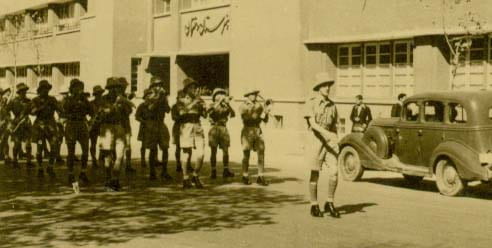[Henryk Wars, né Warszawski]
b. 1902, Warsaw – d. 1977, Beverly Hills, CA
Biography

During his interbellum career, Poland’s foremost film composer, Henryk Warszawski (b. 1902 in Warsaw, d. 1977 in Beverly Hills) shortened his last name to “Wars.” After emigrating to the U.S. in 1947 the composer renamed himself again as “Henry Vars” (the latter change preserves the Polish sound by changing the spelling). These transformations of the name may be explained by the demands of Vars’s career as a successful composer of music for films, TV, and popular songs.Born in Warsaw in 1902, Vars was strongly influenced by American Jazz and quickly established himself as the author of Poland’s most favorite “hit songs” such as “Umówiłem się z nią na dziewiątą”, “Miłość ci wszystko wybaczy”, “Ach jak przyjemnie”, “Zimny drań”, etc. Actually, these songs were all composed for films, especially musicals. As a pillar of the Polish music industry, Vars scored Bezimienni bohaterowie, Sportowiec mimo woli, Manewry mi osne, and many other titles. All these movies and songs had Polish texts and were addressed to a Polish audience. In terms of dance forms, Wars preferred stylized jazz and was the first to introduce American influences to Polish popular music (e.g. song “New York Times” of 1928). Some of his hits are tangos, none are polkas.
The composer’s thriving Polish career was cut short by the war. Vars’s war-time saga took him through service in the Polish Army and German captivity. He escaped imprisonment by the Nazis and became the leader of the music group working for the Army, “The Polish Parade.” Vars’s group traveled with the Polish Army of General Anders (1941-1947, in Iraq, Palestine, Egypt, Italy).

After settling in the U.S. in 1947, Vars worked hard to establish himself in the film business. He received many awards and distinctions, and had a chance to meet numerous famous politicians and artists. In a survey conducted in 1998 by the Polish news weekly, Wprost, “Miłość ci wszystko wybaczy” [Love will forgive you everything] by Henryk Vars was ranked as no. 1 among Polish popular songs of the past 50 years. This song recently appeared in Steven Spielberg’s Schindler’s List. Vars’s songs are still sung and cherished, but his life is not well known to scholars and music historians—he does not even have an entry in the New Grove Dictionary of Music and Musicians, a standard English-language music reference work. It has been completely unknown that Vars composed numerous “classical music” pieces, scored for orchestra and chamber ensembles. One of these works was selected for donation to the PMC Manuscript Collection by Elizabeth Vars, his wife: Sonatina for Orchestra, dedicated to Maurice Ravel (score and parts). The rest of this collection will be officially accepted as a donation to the Polish Music Center in Fall of 2005.
List of Works
Perhaps best known for his score to Flipper (both the film and television series), Vars scored over 80 films in his career. He also composed for television and continued to write popular songs. For the most part, American studiocomposers of the 1950s still wrote within the musical conventions of the classic Hollywood style that crystallized in the 1930s. In many ways Vars was a typical industry composer of the time, writing scores (often anonymously) for a variety of popular genres including mysteries, crime dramas, science fiction films and westerns. He, too, worked within musical conventions that emphasized leitmotifs, the use of a full symphony orchestra, and late nineteenth-century harmonies. But Vars was also unique in the breadth of musical experience that he brought to his work.
[From Linda Schubert, “Recovering a Repertory: The American Film Scores of Henry Vars,” presented during the Polish/Jewish/Music! International Conference, USC, November 1998]
Manuscripts at USC
See the Henryk Wars Collection
Links
Schubert article, Polish Music Journal vol. 4 no. 1
Page updated on 4 April 2018